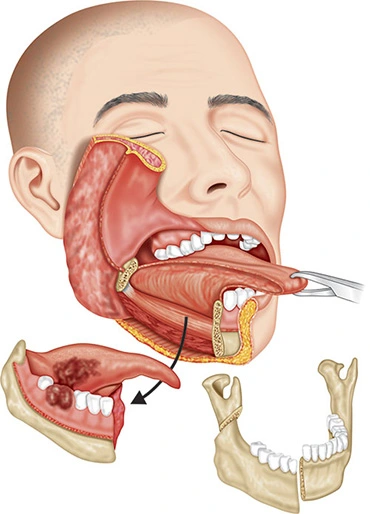Radical maxillectomy with mandibulectomy
India
-
Our Price USD 12420
-
Hospital Price USD 13800
-
You Save : USD 1380
Booking Amount: USD 1242. Pay Remaining 90% at the hospital.
Book NowAdditional Credit
Among the important extras we offer as part of the Additional Credit are the following:
-
Site Tourism For The Patient & Attendant
-
Airport Pick & Drop Service
-
Ambulance service at airport
-
Priority appointments with The Doctor
-
Cancel Easily Anytime with Full Refund
-
Room Upgradation
-
Free Online Doctor Consultation Valued at USD 20
-
Free hotel Stay for 5 to 7 days Accordingly
-
Welcome Kit at Arrival
-
Interpreter
-
Medical Visa Assistance
What is Included?
- Doctor consultation charges
- Lab tests and diagnostic charges
- Room charges inside hospital during the procedure
- Surgeon Fee
- Cost of implant
- Nursing charges
- Hospital surgery suite charges
- Anesthesia charges
- Routine medicines and routine consumables (bandages, dressings etc.)
- Food and Beverages inside hospital stay for patient and one attendant.
What is not Included?
- Extra Radiology Investigations
- Healthcare Professionals Charges of other consultations.
- Other Requested Services such as Laundry etc.
- Additional Pharmaceutical Products and Medicines After Discharge from Hospital.
- Management of Conditions Unrelated to Procedures or Pre-Existing.
- The cost of any additional implants will be in addition to the package cost.
Package Description
Procedure Description:
Radical maxillectomy with mandibulectomy
A major section of the skull base, comprising the maxilla and mandible bones as well as surrounding tissues, are removed during a radical maxillectomy with mandibulectomy. This operation is usually carried out to remove benign tumors that are close to the skull base or to treat advanced cancers of the skull base, such as cancers of the sinuses and nasal cavity. Because of its complexity, the surgery may call for the cooperation of several medical professionals, such as a radiation oncologist, a maxillofacial surgeon, and an otolaryngologist (a specialist in the ears, nose, and throat). Eliminating the cancer or tumor, reducing the chance of a recurrence, and preserving the greatest amount of healthy tissue are the main objectives of this treatment.
Disease Overview:
Mouth Cancer:
Any type of cancer that arises in any area of the mouth (oral cavity) is referred to as mouth cancer. The following areas are susceptible to mouth cancer: the lips, gums, tongue, inner cheek lining, roof of the mouth, floor of the mouth (under the tongue), Oral cancer, often known as oral cavity cancer, is the term used to describe cancer that develops inside the mouth.
The term "head and neck cancers" refers to a group of cancers that includes mouth cancer. Treatment for malignancies of the mouth, neck, and other regions is frequently similar.
Disease Sign and Symptoms:
Mouth cancer symptoms and indicators could include:
1. An unhealing sore on the lips or mouth
2. A patch of white or reddish color on the interior of your lips
3. Missing teeth
4. A growth or bump in your oral cavity
5. Sore mouth
6. Pain in the ears
7- Painful or difficult swallowing
Disease Causes:
When cells in the mouth or on the lips experience genetic alterations, or mutations, mouth cancers can result. The instructions that inform a cell what to do are encoded in its DNA. When healthy cells would divide and expand, the mutations instruct the cells to keep going. Tumors might arise from the aberrant mouth cancer cells that keep multiplying. They might eventually make their way outside of the mouth and into the neck, head, and other body parts.
Squamous cells, which are thin, flat cells that line your lips and the interior of your mouth, are where mouth cancers most frequently start. Squamous cell carcinomas comprise the majority of oral malignancies.
The exact cause of the squamous cell alterations that result in mouth cancer is unknown. However, medical professionals have found a few things that might make mouth cancer more likely.
Risk Factors:
Using tobacco of any form, including cigarettes, cigars, pipes, chewing tobacco, and snuff, among others, can up your risk of developing mouth cancer.
- Excessive alcohol consumption
- Prolonged exposure to the sun on your lips
- The human papillomavirus (HPV), a sexually transmitted infection.
- A compromised immune system
Disease Diagnosis:
The following tests and methods are used to diagnose oral cancer:
1. Physical examination. Your lips and mouth will be examined by your physician or dentist to check for abnormalities, such as sores or white patches (leukoplakia), which are areas of irritation.
2. Tissue removal for examination (biopsy). Your doctor or dentist may perform a biopsy, or sample of cells taken for laboratory examination, if a worrisome area is discovered.
Following a diagnosis of mouth cancer, your doctor will try to ascertain the cancer's stage and extent. Tests for staging mouth cancer could include:
- A tiny camera is used to examine your neck. Your doctor may insert a small, flexible camera with a light down your throat during an endoscopic procedure to check for evidence of cancerous growths outside of your mouth.
- Imaging testing. Several imaging techniques could be used to assess if cancer has progressed outside of your mouth. Among other imaging studies, these might include positron emission tomography (PET) scans, CT, MRIs, and X-rays.
Disease Treatment:
The location and stage of your disease, together with your general health and personal preferences, will all influence your treatment options for mouth cancer. You might receive only one kind of cancer treatment, or you might receive several different kinds of treatments. Chemotherapy, radiation, and surgery are available treatment options.
Surgery:
For oral cancer, surgery could involve:
1. Tumor excision surgery. To be sure all cancer cells are gone, your surgeon could remove the tumor along with a margin of surrounding healthy tissue.
2. Neck cancer removal with surgery. Should cancer cells have progressed to the lymph nodes in your neck, or if there's a strong likelihood of this occurring given the size or extent of your cancer, your surgeon can suggest a neck dissection treatment to remove the lymph nodes and associated tissue.
3. Oral reconstruction surgery. Following the cancer removal procedure, your physician can suggest reconstructive surgery to restore your mouth and enable you to speak and eat normally again.
A radical maxillectomy with mandibulectomy is a surgical surgery in which a large piece of the base of the skull, including the mandible and maxilla bones, as well as surrounding tissues, are removed. The usual reasons for this technique include removal of benign tumors near the skull base or treatment of advanced malignancy of the skull base, such as malignancies of the sinuses and nasal cavity. A maxillofacial surgeon, a radiation oncologist, and an otolaryngologist—a expert in the disorders of the ears, nose, and throat—may need to work together on this intricate surgical procedure. This procedure's main objectives are to eradicate the cancer or tumor, reduce the chance of a recurrence, and preserve the greatest amount of healthy tissue.
Information related to Treatment
Package Details
Days in Hospital
7 Days
Days in Hotel
*
14 Days
Room Type
Private

Treating Doctor
Dr. S M Shuaib Zaidi
Surgical oncologist- Gynecologic oncology, Sarcoma Treatment, Head and Neck Tumor / Cancer Surgery, Breast Cancer, Cancer Surgery, Stem cell transplantation, Neck and parotid cancers, MOHS Surgery, Lung Cancer Treatment
Indraprastha Apollo Hospitals, New Delhi Faridabad, India
29 Years of Experience


